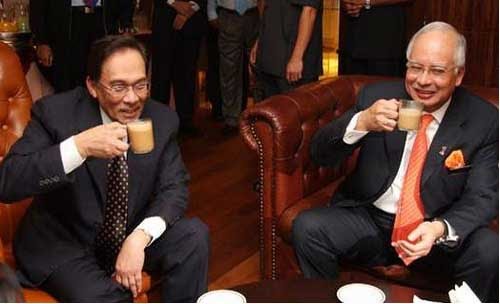 |
| If only democracy is truly practised in Malaysia |
KUALA LUMPUR - Changes in political leadership, defections, acrimonious exits, bruising by-elections, with results seen to reflect the rejuvenation of Barisan Nasional, and the postponement of Umno polls that sparked talk of an early general election shaped the political landscape of 2010.
The leadership change in the MIC, once notorious for its rowdy meetings where the throwing of chairs seemed to be a fixture in the agenda, was a model of smooth transition.
After 31 years at the helm, Datuk Seri S. Samy Vellu, one of the country's most colourful politicians, bowed out graciously on Dec 6 although his term of office was due to end only in March 2011.
The 74-year-old Samy Vellu, who had led the party since 1979 and is its longest serving president, handed over the reins to his deputy, Datuk G. Palanivel.
Samy Vellu is also the longest serving minister, and would still have been in the cabinet if not for his defeat in the 2008 general election, when BN lost its two-thirds majority in Parliament.
It was a different story with the MCA, which underwent unexpected changes in the leadership after the general election.
Ong Tee Keat was elected president, but lasted only 17 months in office.
He was beaten in the March party polls by Datuk Dr Chua Soi Lek, who had resigned at the end of 2007 over a sex VCD scandal.
Dr Chua had been elected deputy president in 2008, but he and Ong never got along.
When many thought that the scandal had ruined his political career, Dr Chua won the top post in a three-corner fight, with former president Tan Sri Ong Ka Ting joining the fray.
All seemed well with Gerakan under the leadership of former Penang Chief Minister Tan Sri Dr Koh Tsu Koon until the party was jolted by a blast from its immediate past president Tun Dr Lim Keng Yaik.
Dr Lim announced last September that he was quitting as party advisor because he was unhappy with Koh's approach in handling issues affecting the party.
He criticised Koh as a leader who "sees no evil, hears no evil," akin to an ostrich who "buries his head in the sand".
The spat caused uneasiness among the party members before a truce was worked out behind the scenes.
Whether the truce will hold remains to be seen. But suggestions that a reported move to postpone elections next year is indicative of a continuing rift is surely off the mark.
Umno is showing more stability as well as eagerness to win back BN's two- thirds majority in Parliament and the four states now under opposition control -- Selangor, Kedah, Penang and Kelantan.
Perak is now under BN following defections from PKR and the DAP.
Prime Minister and Umno President Datuk Seri Najib Tun Razak continued his innovative and down-to-earth approach, meeting party members and the rakyat in his tour of the country and promoting his 1Malaysia "People First, Performance Now" programme.
The accompanying transformation programmes he introduced seemed to have gone done well with the people.
Opinion polls and, more dramatically, by-election victories point to increasing support for Umno and BN.
Of the four by-elections held this year, BN won three, including the last two, which were held simultaneously in Kelantan and Sabah.
BN seemed also to have impressed some opposition MPs. Eight of them defected from PKR and PAS. Although Independent in status, they are now BN friendly.
The growing confidence of the 13-party coalition was apparent at the BN convention on Dec 5, where over 1,500 delegates gathered at the MCA headquarters here.
Najib's rallying-of-the-troops speech -- plus the postponement of Umno elections -- set off speculation that the 13th general election will be held next year although the current parliament term only expires in 2013.
After the euphoria of its best ever electoral performance, the opposition found itself embroiled in squabbling that marred its reputation.
PKR was inflicted most by internal dissention. Holdingb its first direct party elections, it caught the headlines for all the wrong reasons, with many members expressing unhappiness with the leadership.
Some 400,000 members from 218 divisions were eligible to vote in the elections between Sept 17 and Nov 21 following amendments made to the party constitution last year. But only slightly over 10 per cent of them exercised their rights.
Former minister and prominent lawyer Datuk Zaid Ibrahim pulled out of the race for deputy president, accusing his rival, vice-President Azmin Ali, of cheating -- a charge which the newly elected number two have denied.
Zahid has also been critical of Anwar, PKR's de facto leader, and had asked him to withdraw from the party.
The whole affair raised doubts over the party's ability to form a viable government if it ever comes to power.
The DAP too is seeing a leadership tussle in several states, with the various factions fighting for position in anticipation of a general election.
If 2010 is ending with the beginnings of election fever, next year will witness temperatures rising, abating only after the frenzy of the general election.
Which will be -- when?
-- BERNAMA



No comments:
Post a Comment
Note: Only a member of this blog may post a comment.